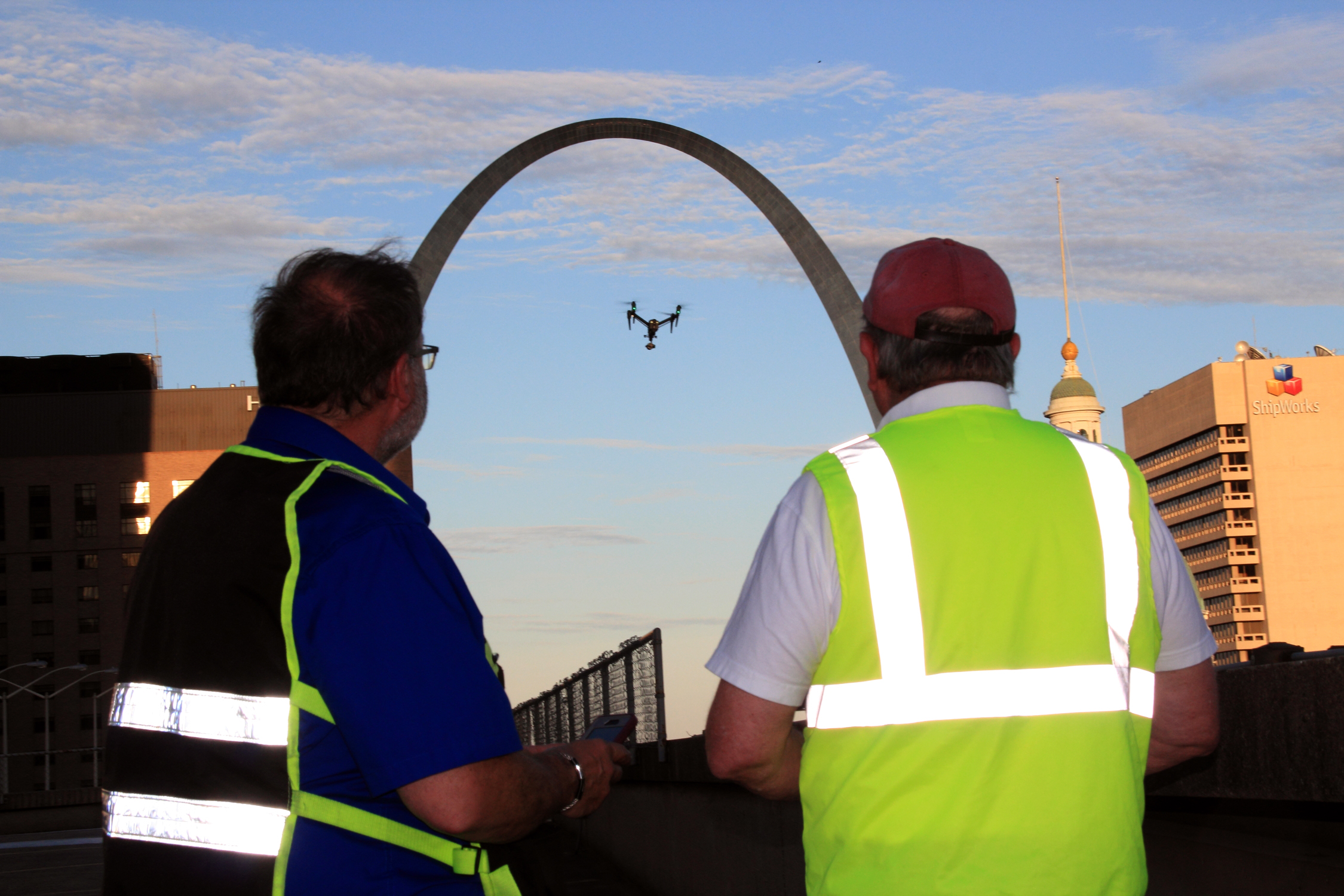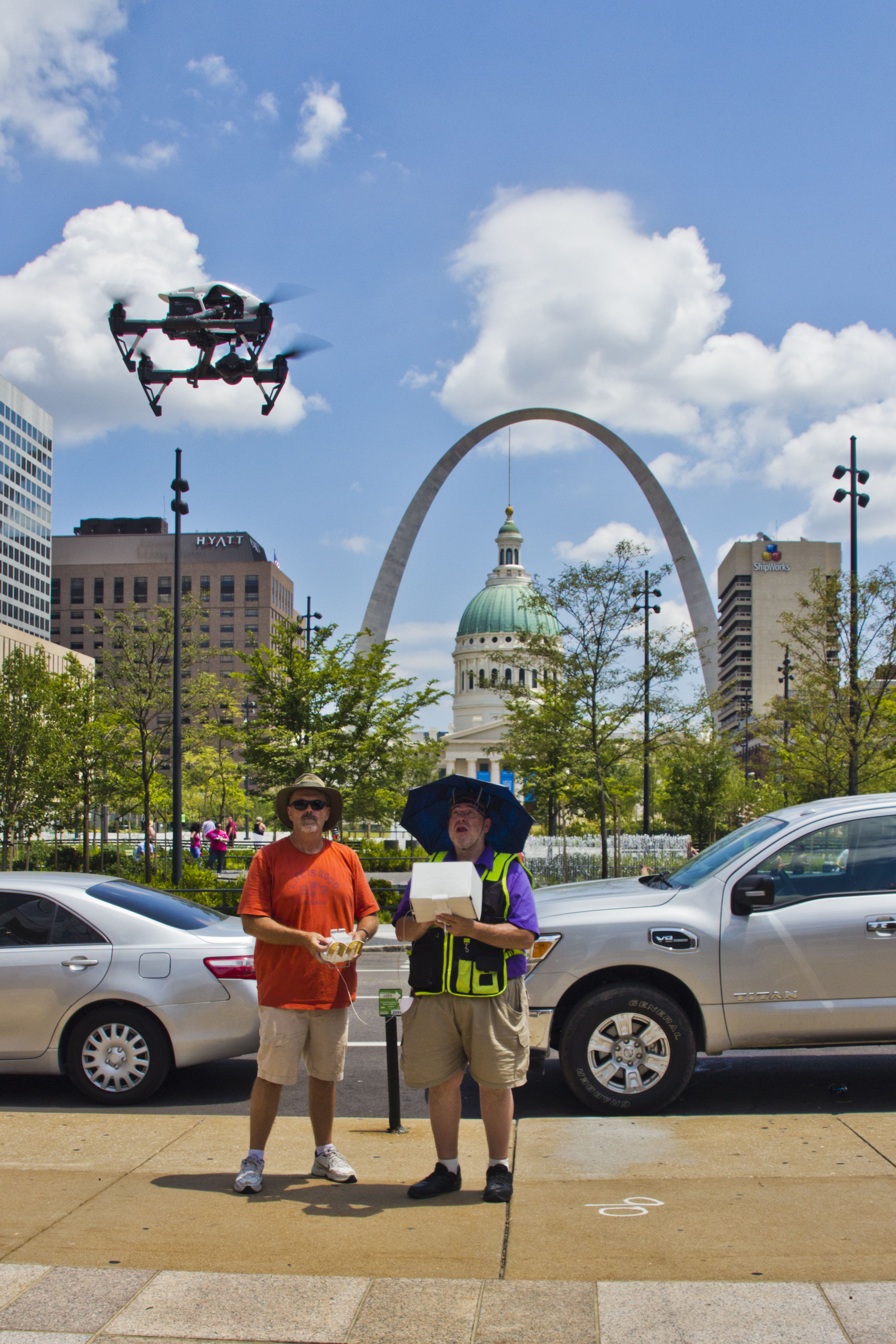FAA approved. We are Safe-To-Fly. We have our 333 exemption and our 107. We also have licensed pilots. We adhere to all FAA guidelines. For safety and quality, we shoot with a two-man crew, and we are fully insured. Our flight specialists always keep visual contact with the drone, while our navigator guides and directs the shot.








We are a St Louis Drone Video Production and Photography company. We are a small firm that has been in the photography and video business since 1982. In the past we’ve shot traditional films with aerials, but since 2014 we have logged many thousands of hours with our aerial drones.
We fly with the Inspire Cinematography Drone, truly a professional aerial platform, with a smooth fluid motion gimbal. Even better we have the Zenmuse X-5 camera. Nice visual options with wonderful wide lens attachments. Worlds away from that fish-eye Phantom Look.






We shoot video at 4K, 4096 x 2150 in Ultra High Definition, much faster than normal HD at 1920 x 1080. Still photographs are jpg and raw dng images at 16 megapixel HD – High Definition and can be easily enlarged.

Aerial photography is a great way to capture your audience’s attention. The first 10 to 15 seconds of each video should be the make or break period. By using an unusual perspective (like aerial videos or aerial photography) to draw them in for the beginning of the video.







Our small, highly maneuverable drones are lightweight, battery powered & fly very smoothly – and more importantly are very discreet. Our aerial photography and drone video flight patterns are determined beforehand. The places that we are able to fly these aerial drones and the angles we can achieve will captivate and amaze your audience. We provide turn-key video production and editing as well as raw HD footage of your use.
Navigating through Legalities & Regulations when it Comes to Drone Filming & Photography.
Drone filming and photography is a rapidly growing industry and the possibilities are endless, however, navigating through the legalities and regulations surrounding it can be a bit overwhelming. It is essential to understand the rules and regulations that come with drone filming and photography, as the consequences of not following them can be serious. Knowing the rules and regulations can also help you get the most out of your drone filming and photography experience. Whether you’re a recreational hobbyist, or a professional, understanding the necessary steps and regulations you must follow is key. This article will go over the basics of drone filming and photography regulations.
What are the basic regulations for drone filming and photography?
The Federal Aviation Administration (FAA) regulates all aspects of drone filming and photography in the United States. It is important to keep in mind that these regulations are constantly changing and updating, so it is essential to stay up to date on the latest regulations. In general, drones must be registered with the FAA, and operators must have a valid FAA registration number. Additionally, drones must not be flown higher than 400 feet above the ground and must remain within sight of the operator at all times. Drone operators must also adhere to local laws and regulations, and should be aware of any temporary flight restrictions (TFRs) in the area.
In terms of commercial drone operations, the FAA requires that operators have a Remote Pilot Certificate (RPC). This certificate can be obtained by taking a knowledge test at an FAA approved test center. The test covers topics such as airspace rules, aviation weather, and aeronautical decision-making. Additionally, the operator must have a valid medical certificate in order to operate a drone commercially.
What are the restrictions on flying a drone?
The FAA has a number of restrictions in place when it comes to flying a drone. For starters, drones must not be flown over people or crowds, and must remain in the operator’s line of sight at all times. Additionally, drones must not be flown near airports, military bases, or other restricted areas. Drones must also not be flown at night, and operators must be aware of any temporary flight restrictions in the area.
Finally, drones must not be used for any type of careless or reckless flying. This includes flying too close to people, buildings, or other objects, or flying in bad weather conditions. Operators should also be aware of their surroundings and should not fly their drone in an unsafe manner.
How to obtain a license for drone filming and photography?
The first step to obtaining a license for drone filming and photography is to register the drone with the FAA. This can be done online and requires the operator to provide information such as their name, address, and a valid email address. Once the drone has been registered, the operator can then apply for a Remote Pilot Certificate (RPC) by taking a knowledge test at an FAA approved test center. Additionally, the operator must have a valid medical certificate in order to operate a drone commercially.
Once the knowledge test has been passed and the medical certificate has been obtained, the operator can then apply for a license. This license will allow the operator to legally operate a drone for commercial purposes. The license must be renewed annually, and the operator must adhere to all FAA regulations.
What are the insurance requirements for drone filming and photography?
The FAA requires all drone operators to have liability insurance in order to operate their drones commercially. This insurance covers any damages or legal fees that may arise from a drone accident, and will also cover any losses incurred due to a drone malfunction. Additionally, some states may require drone operators to have additional insurance for their drones.
It is important to note that the insurance requirements for drone filming and photography vary by state. It is important to research the insurance requirements in the state you plan to operate your drone in, and to obtain the necessary insurance coverage.
How to stay compliant with drone filming and photography regulations?
Staying compliant with drone filming and photography regulations is essential for a safe and legal experience. The first step is to make sure that the drone is registered with the FAA and that the operator has a valid Remote Pilot Certificate. Additionally, the operator must have a valid medical certificate and must adhere to all local laws and regulations.
It is also important to stay up to date on the latest regulations and to be aware of any temporary flight restrictions in the area. Additionally, the drone must remain within sight of the operator at all times and must not be flown over people or crowds. Finally, the operator must adhere to all FAA regulations and should not fly their drone in an unsafe manner.
What are the penalties for violating drone filming and photography regulations?
The penalties for violating drone filming and photography regulations can be severe. Violations of FAA regulations can result in civil penalties of up to $27,500, and criminal penalties of up to $250,000 and/or up to three years of imprisonment. Additionally, some states have their own laws and regulations, and violations of these laws can result in additional fines and/or imprisonment.
It is important to note that the FAA has the authority to revoke a drone operator’s Remote Pilot Certificate if they are found to be in violation of any regulations. This could result in the operator being unable to legally operate a drone for commercial purposes.
The importance of having a safe, secure, and legal drone filming and photography experience
Having a safe, secure, and legal drone filming and photography experience is essential for a successful operation. It is important to understand the regulations and laws that apply to drone filming and photography and to adhere to them at all times. Additionally, operators should have the necessary insurance coverage and should be aware of any temporary flight restrictions in the area. By following the regulations and laws, operators can ensure a safe and legal drone filming and photography experience.
Best practices for drone filming and photography
In order to have a successful drone filming and photography experience, there are a few best practices that operators should follow. First, operators should make sure they are familiar with the regulations and laws that apply to drone filming and photography. Additionally, operators should make sure their drone is in good working condition and that it is properly registered with the FAA. Operators should also maintain a line of sight with their drone at all times, and should not fly their drone over people or crowds. Finally, operators should be aware of any temporary flight restrictions in the area and should not fly their drone at night.
Resources to stay up to date on the latest drone filming and photography regulations
It is important to stay up to date on the latest drone filming and photography regulations in order to ensure a safe and legal experience. The FAA’s website is a great resource for staying up to date on the latest regulations and laws. Additionally, there are a number of online forums and websites dedicated to drone filming and photography that can provide valuable insights and information.
Conclusion
Drone filming and photography is a rapidly growing industry and the possibilities are endless. However, it is important to understand the rules and regulations that come with it, as the consequences of not following them can be serious. Knowing the regulations and laws can also help you get the most out of your drone filming and photography experience. Whether you’re a recreational hobbyist, or a professional, understanding the necessary steps and regulations you must follow is key. By following the regulations and best practices outlined in this article, you can ensure a safe, secure, and legal drone filming and photography experience.
314-604-6544
Rob Haller
St Louis Video Producer
stlouiswebvideo@gmail.com